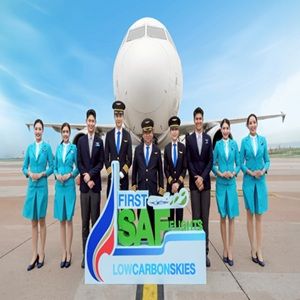Bangkok Airways officially introduces SAF on commercial flights

SOURCE: Bangkok Airways Public Company Limited
July 16, 2025
BY Bangkok Airways Public Company Limited
Bangkok Airways Public Co. Ltd. continues to drive its "Low Carbon Skies by Bangkok Airways" campaign, aiming to reduce carbon dioxide emissions. The airline has officially announced the adoption of sustainable aviation fuel (SAF) on its commercial flights, reinforcing Thailand’s green aviation industry and laying a crucial foundation for environmentally balanced aviation development in the future. The initiative will take effect starting July 1, 2025.
Captain Puttipong Prasarttong-Osoth, president of Bangkok Airways Public Company Limited, revealed that “The official use of SAF on commercial flights marks a significant milestone in the airline’s transition toward a more environmentally friendly aviation future. This initiative aligns with the goal of achieving Net Zero Carbon Emissions, which lies at the heart of sustainability policies in the aviation sector. In 2024, the airline began using SAF on a pilot flight operating between Samui and Bangkok. This time, SAF will be used on commercial flights departing from Bangkok (Suvarnabhumi Airport) to international destinations including Phnom Penh, Siem Reap, Luang Prabang, and the Maldives.”
Bangkok Airways will begin using sustainable aviation fuel (SAF) blended at 1% with 99% Jet A-1 fuel, which can help reduce carbon dioxide emissions by an average of approximately 128 kilograms of CO₂ per flight.
As a leading regional airline, Bangkok Airways is committed to enhancing the quality of its services while upholding its core mission to create sustainable value for all stakeholders. The airline takes pride in delivering memorable and environmentally conscious travel experiences to its passengers, while actively contributing to the genuine and sustainable growth of Thailand’s aviation industry.
Advertisement
Bangkok Airways is committed to evolving into a truly “Sustainable Airline,” guided by the ESG framework, which is integrated across all aspects of its operations. The airline upholds responsibility in three aspects: Environmental, Social, and Governance. In terms of environmental responsibility, Bangkok Airways focuses on climate change management, waste management, efficient use of resources, and the adoption of alternative energy sources. The company continues to explore comprehensive measures to improve fuel efficiency, conduct corporate carbon footprint reporting (Scopes 1–3), expand waste separation bins, and promote the upcycling of operational waste into products that benefit both society and the environment. The airline also encourages stakeholders to participate in environmentally friendly services and initiatives, such as the “Love Earth, Save Earth” project, now in its 8th year, which involves planting coconut trees to support the ecosystem of Koh Samui.
Advertisement
Related Stories
NREL announced the findings of the Assessment of BQ-9000 Biodiesel Properties for 2024, the eighth in a series of annual reports documenting the quality of biodiesel from U.S. and Canadian producers participating in the BQ-9000 program.
Kintetsu World Express Inc. has entered into a new agreement with Shell Aviation regarding the use of SAF. Under this agreement, KWE will adopt Shell Aviation's digital platform "Avelia" to swiftly address shippers' low-carbon transportation needs.
The U.S. EIA increased its forecast for 2026 renewable diesel production in its latest Short-Term Energy Outlook, released Aug. 12. The 2026 forecast for SAF production was lowered, but the outlook for biodiesel production was maintained.
Aemetis Inc. released Q2 results, reporting increase revenue when compared to Q1. During an earnings call, company officials detailed progress with the company’s RNG, ethanol, biodiesel, SAF and carbon CCS projects.
Calumet Inc. on Aug. 8 confirmed its Montana Renewables biorefinery is currently running at full capacity. An initial phase of the company’s MaxSAF initiative remains on track to boost SAF capacity to up to 150 MMgy by mid-2026.
Upcoming Events










